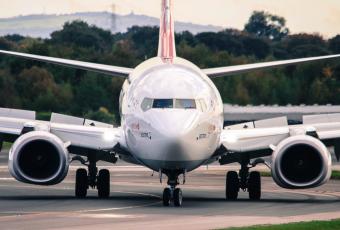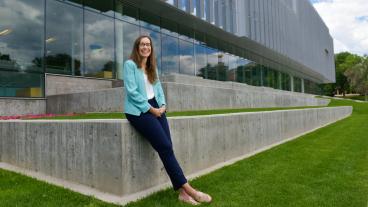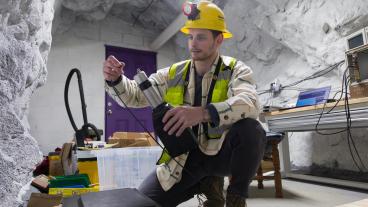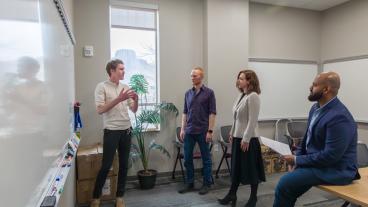A hybrid-electric Boeing 737 airplane? Colorado School of Mines researchers working to lower carbon emissions from air travel

The enormous amount of energy required to operate commercial aircraft makes it one of the most challenging industries to reduce the reliance on energy-rich fossil fuels. But the future of aircraft power may require it, and a team of researchers at Colorado School of Mines are working on meeting that challenge.
With funding from the U.S. Department of Energy’s ARPA-E REEACH (Range Extenders for Electric Aviation with Low Carbon and High Efficiency) program, Mines professors in mechanical and electrical engineering are designing and developing a new generation of hybrid electric power plants for aviation. Collaborating on the project are the University of Maryland and industry partners Raytheon Technologies and Ion Storage Solutions.
“The challenge is designing a system that is lightweight yet mechanically robust enough for aircraft, while supplying the types of energy density of fossil-fueled gas turbine engines,” said Greg Jackson, professor of mechanical engineering. Jackson is the lead investigator on the Mines team, which also includes Robert Braun, Rowlinson professor of mechanical engineering, and Tyrone Vincent, professor of electrical engineering.
The goal of the REEACH program to develop disruptive systems to “convert the chemical energy contained in energy-dense carbon neutral liquid fuels into electric power for aircraft propulsion via electric powertrains and other key systems.”
Why? According to REEACH, air travel is responsible for a growing portion of U.S. energy usage and greenhouse gas emissions. In 2017, air travel in the U.S. consumed nearly 3.5 quadrillion BTUs of jet fuel and was responsible for about 2.6 percent of domestic greenhouse gas emissions. To mitigate the harmful impact of air travel, ultra-high efficient, electrified aircraft propulsion systems are needed.
The Mines team is prepared to tackle the challenge. A highly efficient and cost-effective hybrid-electric turbogenerator that utilizes novel architectures with solid oxide fuel cells will enable their newly proposed system to simultaneously generate electricity and propulsion power for narrow-body aircraft such as the Boeing 737.
And instead of the jet fuel now being used in gas-turbine engines, the system the team is working on will use liquified natural gas that can be produced from a variety of resources including renewable electricity and carbon sources.
Mines’ specific role in the project includes system-level modeling, novel fuel cell and fuel processor design and integration, and development and implementation of advanced controls to ensure reliable operation of the fuel cell housed inside the turbogenerator flow path.
Jackson said the team is working on novel fuel cell structures that can be integrated into the existing high-velocity flow path of a gas turbine engine, which would enable them to operate effectively in the high-temperature, high-pressure environment of the engine combustor.
The team also believes that the designs for aircraft may significantly benefit ground-based power generation, as well. For example, peaker plants that supply energy at times of high demand can adopt these hybrid power approaches to achieve high efficiency with a standard aircraft engine.
The research team will demonstrate the concept by designing and testing a lab-scale system, large enough to power a house, and then engineer approaches to scale it up to aircraft engine size. Certifying any new engine technology for commercial aircraft will require at least 15 years and maybe more.
“How do you redesign these devices to be low mass and sustain the amount of air flow needed? We have some unique ideas on how to do that, and in ways that have never been done before,” Jackson said.




